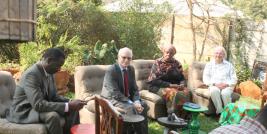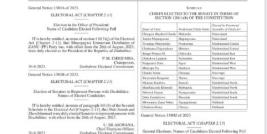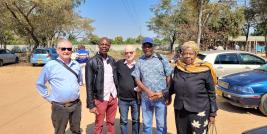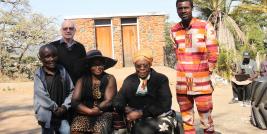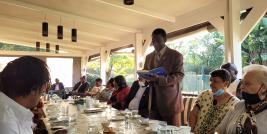Zimbabwe’s 93 year-old dictator, President Robert Mugabe, was forced to resign on November 22, 2017, when he realised that his ZANU-PF MPs were going to impeach him.
The Zimbabwe military moved against Mugabe on Wednesday November 15, in response to Mugabe’s decision to dismiss his Vice-President Emmerson Mnangagwa on Monday November 6. Mnangagwa fled the country in fear of his life, and with good grounds, since Mugabe and his wife Grace called on a rally of ZANU-PF youth on November 8 to “crush the head of the snake”.
However, it is clear now that Mnangagwa had the solid support of the security forces - perhaps apart from the Police chief – as the military had repeatedly hinted to Mugabe over the last year.
http://www.abc.net.au/news/2017-11-22/jubilant-crowds-take-to-the-street...
Despite a hopeless intervention by South African President Jacob Zuma to defend Mugabe in the councils of the Southern Africa Development Community, Mugabe’s fate was sealed. Zuma himself faces a less fraught humiliation at the coming African National Congress National Elective Conference on December 17, 2017.
ZANU-PF chose Mnangagwa to be the new President and he was sworn in to an adoring crowd on November 24. Rapidly, Grace Mugabe, Prof Jonathon Moyo, Saviour Kasukuwere, Kudzanai Chipanga, Ms Mandiitawepi Chimene and Ignatius Chombo were expelled from ZANU-PF, and those who were Ministers or MPs lost their jobs and / or were expelled from Parliament.
Chombo, the Finance Minister, was arrested on corruption charges.
On November 20, junior police officers went on strike for two days, to protest against the way they have been used by senior police to fleece the public at roadblocks. “From Monday the 20th of November all members from Constable to Assistant Inspector lets refuse to obey all orders from our senior officers Inspectors and above. Let’s not go to work from Monday till the new government is in place. We are tired of their extortion, corruption, stupid orders, demands of sexual pleasure from junior officers, demand of cash, projects meant to suck our money,” their statement said. Since then, the military have taken over police patrols in Harare.
War Vets leader and now Special Adviser to the President, Chris Mutsvangwa, has been calling for the arrest of Police Chief Augustine Chihuri and the former head of the Central Intelligence Organisation, Happyton Bonyongwe, for allowing the abuse of police powers and the growing chaos around Mugabe’s presidency.
President Mnangagwa had his new Cabinet sworn in today, December 4, 2017, and with it came the cold shower on public optimism, that it was composed only of ZANU-PF figures, within the constraints of the Constitution. The new Cabinet underlined the reality that the long overdue intervention to get Mugabe to resign is an internal ZANU-PF operation, and the group of people responsible for decades of misrule are apparently now in charge of positive change.
However, Mnangagwa made it clear in his inauguration speech that he wants to have a genuine transition to a more democratic and open politics, in order to provide the opportunity for deeper economic recovery. The elections are due in May 2018.
In the short term, the ordinary people are so relieved that the police roadblocks have gone, that US dollars are now more available through the banks, and several political detainees are now free and charges dropped. They see that the new President goes to work early, in his own car, without a police escort, and that his car even stops at the red lights, like everyone else. The new President clearly knows how to maximise the impact of symbolic change, and is eager to demonstrate that positive change is underway. The multiple opposition parties and their two main alliances for the coming elections – MDC Alliance (Morgan Tsvangirai) and Peoples Rainbow Coalition (Joice Mujuru) – are now faced with a sharp new reality in President Mnangagwa and need to find a way to unite for change with an economic program that the international community and China can engage with. Some of them hoped to be included in the new Cabinet, and even called for elections to be postponed, but that is now off the table.
The Australian government has a long-term engagement with the Zimbabwean people and is in a credible position to persuade the broader international community about how to maximise the potential economic and social recovery of the nation through the electoral processes now underway.
The Zimbabwe Information Centre in Australia salutes the people of Zimbabwe for their success in finally removing the dictator Mugabe. ZIC will continue its work in maintaining an information flow and supporting genuine democratic change, women’s empowerment and ecological sustainability in Zimbabwe.
Zimbabwe Information Centre
December 4, 2017

